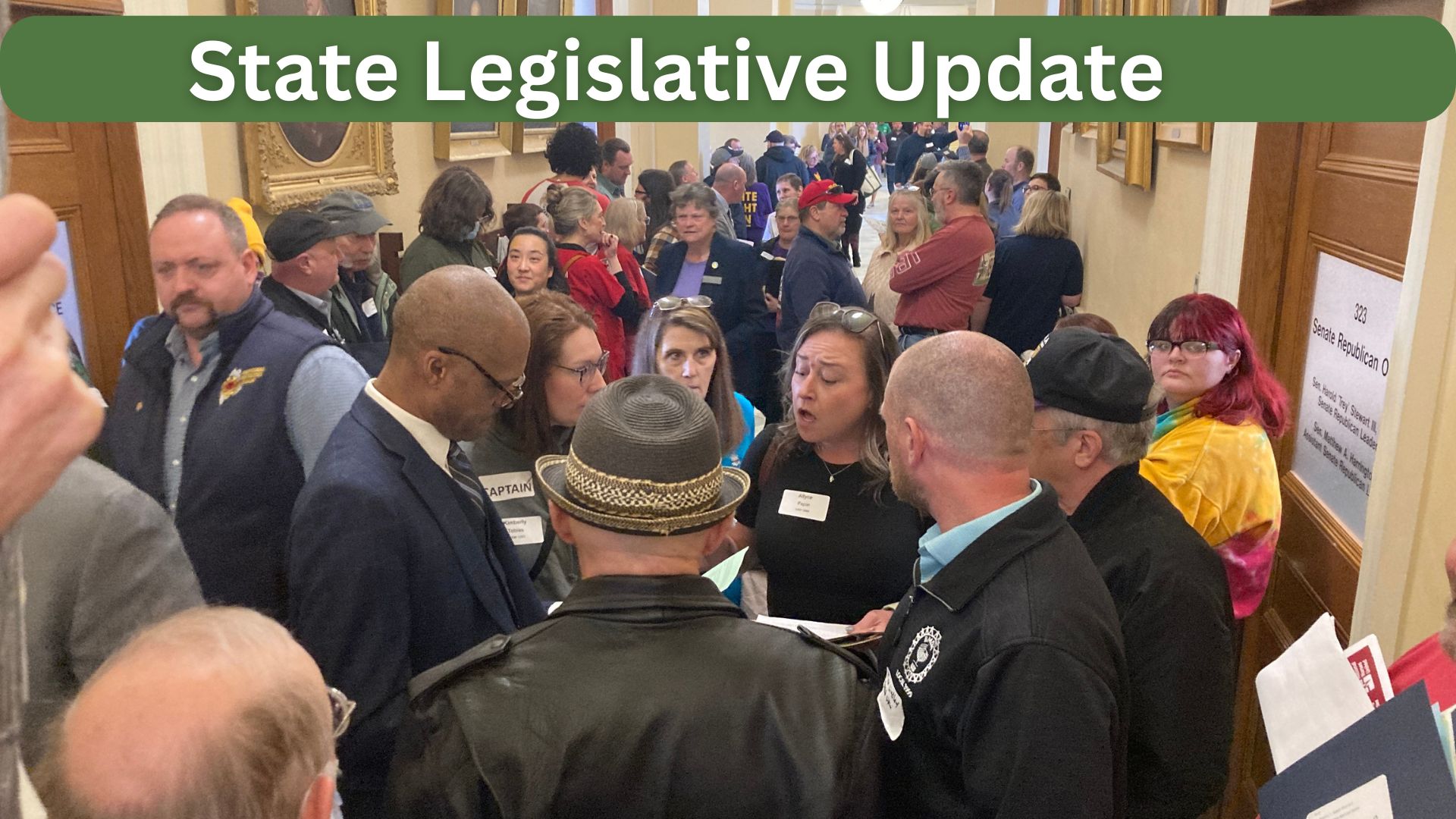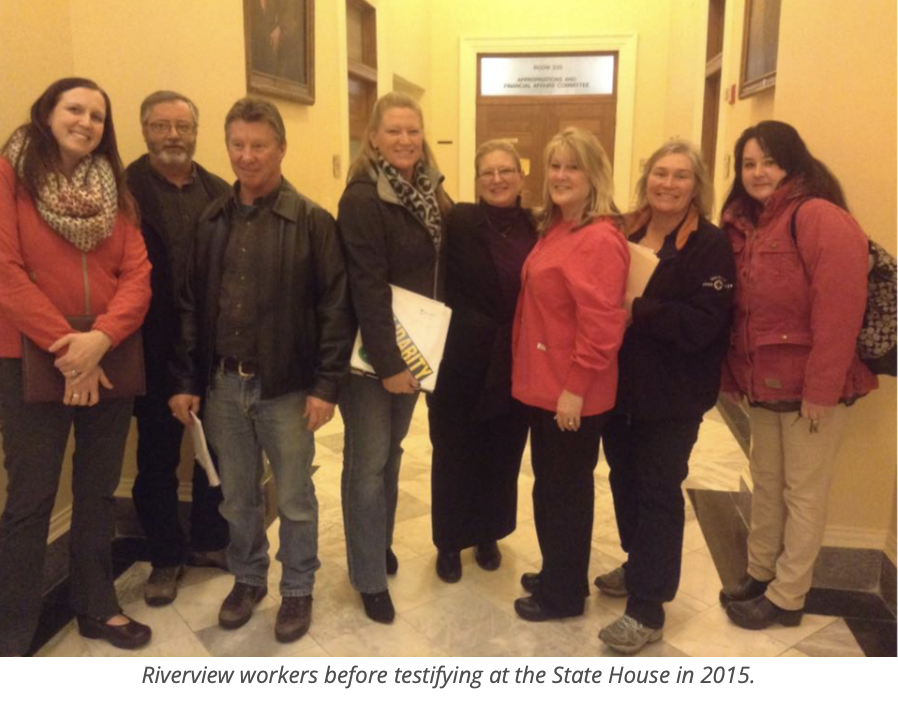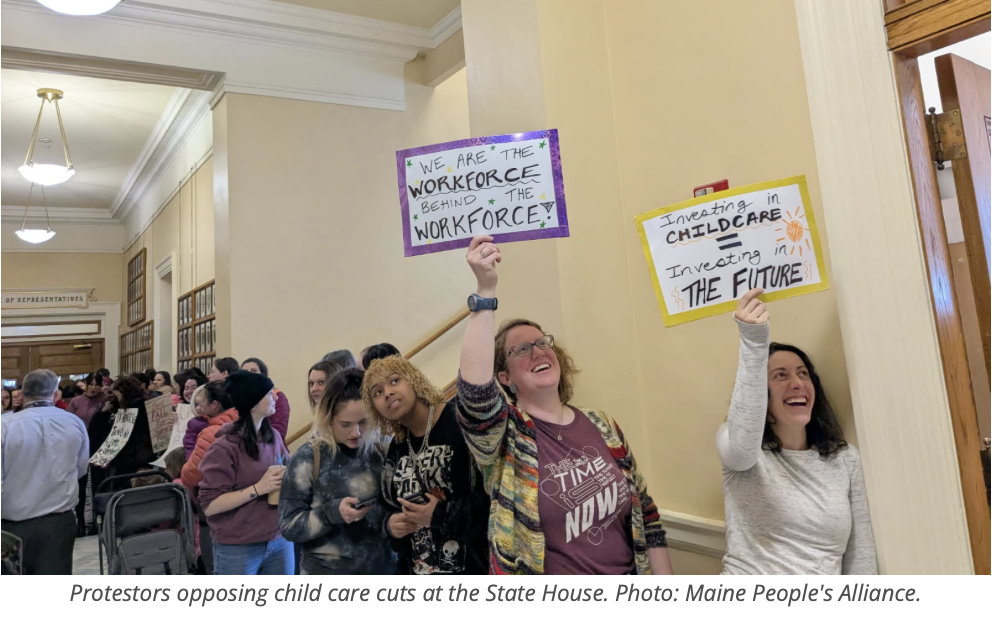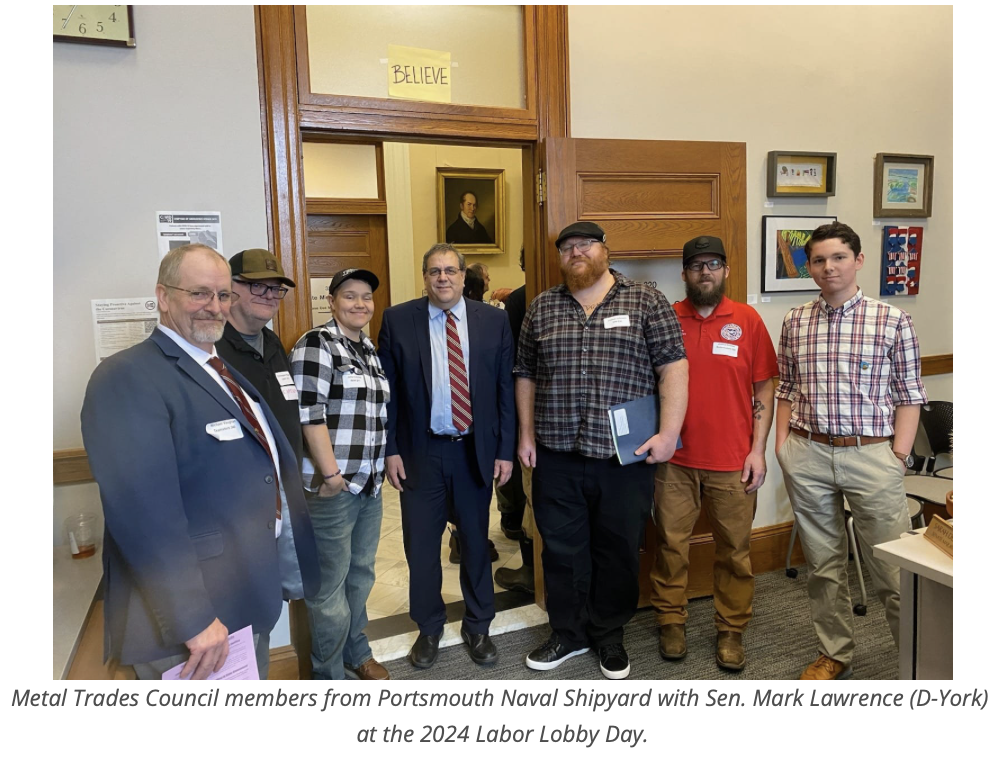Special Edition: State Legislative Recap - Victories & Disappointments

Download print-ready PDFs of Maine State Labor News here!
IN THIS EDITION:
- Legislative Session Brings Victories for Working Parents, Mental Health Workers & Building Trades
- Mental Health Workers Win Improved Retirement to Strengthen Staffing & Retention
- State Budget Rejects Cuts to Child Care for Working Families
- Governor & Legislature Fail to Make Progress to Address Pay Gap & Staffing Crisis in State Government
- Budget Continues Funding for Universal Free School Meals
- Legislature Makes Permanent Protections for Firefighters with PTSD
- “Right to Work For Less” Bill Dies Unceremoniously
- Legislation Continues Funding for Peer Workforce Navigator Program
- Unions Applaud Passage of State Clean Energy Bills
- Governor Signs Bill to Make Farmworkers Eligible for Minimum Wage, Vetoes Farmworker Rights Bill
- Nurse Ratios Bill Carried Over Until Next Session
Legislative Session Brings Victories for Working Parents, Mental Health Workers & Building Trades; Work Remains to Close Pay Gap and Address State Recruitment and Retention

The Maine Legislature has finished up most of its work after passing the second part of its two-year budget on a party-line vote. On June 23, Governor Janet Mills signed the budget, which includes child care affordability programs, a new stronger retirement plan for mental health workers at state psychiatric facilities, the universal free school meals program, funding MaineCare for hospitals and more.
The Legislature began its first regular session earlier this year with the daunting task of fixing a budget shortfall over the next two years. From the beginning, Governor Janet Mills ruled out rolling back former Governor Paul LePage’s tax cuts for the wealthy and other progressive taxation measures. In the end, the Legislature passed a budget that included some improvement provisions and limited significant cuts.
Overall this session, workers and unions made meaningful, incremental progress on a number of fronts - winning improvements to retirement security for mental health workers, protecting important recent gains around childcare and free school lunches, making gains to ensure clean energy jobs are good quality jobs, making advancements to improve working conditions in the construction industry and more. At the same time, there is much work to do to address deep recruitment and retention problems in state government and address the pay gap for state workers. We are disappointed that broader progress was not made on this front and we will be back in 2026 to continue working on this issue. Below are some of the highlights and areas where we unfortunately fell short this legislative session. There were a lot of bills to sort through and some bills are currently on the Governor's desk. This is an initial review and we will provide ongoing analysis and reflection on the Legislative session.
Mental Health Workers Win Improved Retirement to Strengthen Staffing & Retention
 Riverview workers supporting a bill to improve to their retirement in 2023.
Riverview workers supporting a bill to improve to their retirement in 2023.
For a decade, mental workers (AFSCME 1814 & AFSCME 1825) have been traveling to Augusta to testify and lobby our legislators to improve staffing and retention at the state’s psychiatric hospitals, Riverview in Augusta and Dorothea Dix in Bangor. Last week, they won a major victory in securing funding that will allow them to join police, firefighters and corrections officers in the 1998 Special Plan of the Maine Public Employees Retirement System. This will allow them to retire at 55 or after 25 years of service. Finally, these hardworking professionals will have a retirement plan that recognizes the inherent dangers of their jobs.
Staff at the state hospitals work with some of the most acutely mentally ill patients in the state, including those whom courts have deemed are at imminent risk of harm to themselves or others, incompetent to stand trial, and not criminally responsible by reason of mental illness.
ASFCME 1814 member Penny Hill was one the workers who repeatedly told harrowing stories of being assaulted by patients at the hospital due to short staffing. At 60 years old, Penny will likely be the first Riverview worker to retire under the plan in September after 38 years of working with patients at Riverview.
“I am so excited andI cannot wait. When I was told we secured the funding for the retirement plan I cried,” she said. “I think we all worked really well together as a team. We were bound and determined to fight and keep fighting.”

Unlike jails and prisons, Riverview and Dorothea Dix are clinical environments where residents are treated like patients rather than criminals. The frontline mental health workers don’t use mechanical restraints or pepper spray to control patients when they act out violently due to a mental health crisis. They typically talk them down. Many of the workers have had family members who lived at the facility or at the former Augusta Mental Health Institute and have developed a strong sense of empathy and compassion for their patients.
But without enough staffing, they also have countless stories of workers being rushed to the hospital with serious injuries when de-escalation techniques with patients fail during violent episodes. Previously, the Legislature passed similar bills to add mental health crisis workers to the 25/55 retirement plan, but ultimately failed to fund it. It was very frustrating and dispiriting at times, but the workers kept coming back year after year to tell their stories and often, bringing lawmakers to tears.
“After working for so many years and having been disappointed so many times, we are just thrilled to finally win this excellent benefit,” said ASFCME 1814 President Sally Nichols. “We’re really hoping this will help with staff recruitment and retention. We want to sincerely thank our legislators for fighting to secure funding for this bill."
We want to especially thank Senator Mike Tipping (D-Penobscot) who sponsored the retirement bill (LD 579) and worked hard to ensure it was funded. Last year, the Maine AFL-CIO canvassing team of union members knocked on many doors in Senator Tipping’s district and had a positive impact on the outcome of his race which he won by just 132 votes. This hard fought victory is a testament to the power of workers’ organizing and using our collective power to help elect pro-worker candidates who will make real improvements to people’s lives.
As Sen. Tipping said in a statement, “You might think that being in politics right now would make you cynical, but experiences like these, where I can work with good people to advance good causes that actually make a difference, renews my faith in our democracy.”
We also want to thank Sen. President Mattie Daughtry (D - Sagadahoc) and Speaker Ryan Fecteau (D - Biddeford), both of whom worked extremely hard to make this legislation happen.
The strategy at Riverview and Dorothea Dix has always been one of incremental progress. We recognize that there are other frontline workers - nurses & others - who face real risks on the job and should be in this same retirement plan. We will be back in future legislative sessions to cover additional workers.
State Budget Rejects Cuts to Child Care for Working Families

The Maine Legislature rejected Governor Mills’ proposed $40 million in cuts to child care affordability programs after child educators, working parents and providers organized a strong movement to preserve these critical programs. After child care providers shut down for the day and hundreds of early childhood educators and parents flooded the State House to protest the cuts, majorities on legislative committees voted to oppose the Governor’s proposals that would have:
- Slashed funding for the Child Care Employment Award, which has allowed many more families to qualify for help paying for child care than previously by paying for child care workers to have their own children in care.
- Cut $30 million from the Child Care Salary Supplement Program that provides $200-$300 monthly stipends to child care workers based on skill level. These cuts would reduce workers’ wages by $2,000 a year, from $16.40/hr. to $15.15/hr (just $31,500 a year). This is keeping child care workers in the field, and without them, there is no child care.
- Cut $7.2 million from Head Start which helps children from low-income families get ready for school.
Many union members and working families in Maine struggle to access childcare and afford it if they can find a slot. We've been working hard as part of a broader coalition of organizations to strengthen Maine's childcare system, improve access and lower cost. We made significant progress last year. It is great news that the Legislature prevented these cuts and we look forward to future work to continue improving Maine's childcare system.
Governor & Legislature Fail to Make Progress on Pay Gap & Staffing Crisis in State Government

One of the major disappointments this session was the Governor and Legislature’s lack of action and progress on the staffing crisis and pay gap in state government. For a number of years, the State of Maine has had a serious understaffing and recruitment and retention problem. Two state-commissioned studies show that state workers are underpaid by 15 percent, on average, compared to their public and private sector counterparts in Maine and New England.
Maine Service Employees Association Executive Director Alec Maybarduk said “pretty much all” of MSEA’s bills addressing the pay gap failed to be funded and are carried over until next year. He said the Legislature actually made the Governor's budget worse for state workers by cutting funding for personnel by increasing the projected attrition rate. While this won’t automatically create layoffs, combined with the the prospect of an economic downturn and loss of federal funding from President Trump’s budget bill, “it very well could squeeze the already understaffed, and uncompensated state workforce even further,” he said.
“It certainly made staffing and the pay gap harder to solve,” Maybarduk added.
The pay gap and insufficient pay has contributed to chronic understaffing which leads to a negative impact on the delivery of public services and the deterioration of morale and working conditions in state work. We hear about these examples daily - ferries cancelled due to short staffing; plow drivers who cannot cover their entire range and worry about the safety of people driving on our roads; mental health workers fearing for the safety of their patients and themselves; dispatch workers working constant overtime and many more.
We will be back next legislative session to make progress on this issue.
Tax Fairness Masures Falter - For Now
There were multiple bills this session, including LD 1089, LD 229 and LD 1879, to make Maine's tax code fairer and have the wealthy pay their fair share. All of these bills were carried over. The Legislature made some improvements to the tax code by incorporating Speaker Ryan Fecteau proposal (LD 1082) to increase the tax rate on the portion of house sales over $1 million for the state’s HOME program that funds affordable housing construction.
Still, as the Maine Center for Economic Policy put it, the budget represents a “missed opportunity” to put Maine on a more sustainable economic path as the cuts in the President Trump’s so-called “Big Beautiful Bill” will deny thousands of Mainers health care coverage, jeopardize our rural hospitals, restrict vital food assistance for thousands of Maine families, eliminate union clean energy jobs and further drive-up energy costs.
Governor Mills recently pointed out that the federal budget bill moving through Congress “finances massive tax cuts for the wealthy on the backs of everyday Maine people and balloons the federal deficit by trillions of dollars.” We agree, but we could help cushion this blow from this federal budget bill if the Governor would support taxing the wealthiest Mainers to pay their fair share.
We hope that as the Legislature grapples with how to keep Mainers whole in light of devastating federal cuts we will pursue measures that make our tax code fairer and have the wealthy pay their fair share.
Bill to Support Federal & State Workers During Government Shutdowns Passes; Bill on Gov. Mills' Desk

The Legislature passed LD 874 An Act to Provide Relief to Federal or State Employees Affected by a Federal Government or State Government Shutdown, sponsored by Rep. Kristi Mathieson (D-Kittery), which would create a loan guarantee program offering interest-free loans to help cover lost income for essential state and federal employees during government shutdowns lasting more than seven days. Workers can receive up to three individual loans per shutdown, with repayment delayed until the shutdown ends or 90 days later, and no interest charged for 180 days after that. The bill was funded by the Appropriations Committee. The bill is on the Governor's desk awaiting her signature; she must take action on it by Monday July 7.
"When the state or federal government shuts down due to political brinksmanship, it’s not politicians that have to face real consequences, it’s working families,” said Rep. Kristi Mathieson (D-Kittery). “State and federal employees in Maine are the backbone of many essential and specialized services – from maintaining public safety and transportation infrastructure to building Navy submarines in Kittery. Government shutdowns mean that these workers will continue to provide these services, but might not get paid for a long time. This bill will provide workers with a lifeline to be able to support themselves and their families until the shutdown is resolved.”
A similar bill, then sponsored by Sen. Troy Jackson, passed the Legislature last year, but ultimately was not funded. The Metal Trades Council and Department of Defense Conference of the American Federation of Government Employees (AFGE), the Northern New England Carpenters Locals 349 and 352, Local 3073 at Portsmouth Naval Shipyard, the Maine Service Employees Association, SEIU Local 1989, the Maine Credit Union League, the Maine Bankers Association and many others testified in support of this legislation at its public hearing in April.
We appreciate the leadership of Rep. Mathieson (D - Kittery), Sen. Bailey (D - York) and Sen. Reny (D - Lincoln) as well as House and Senate Democratic leaders in moving this bill forward. We are hopeful that Gov. Mills will sign it into law.
Budget Continues Funding for Universal Free School Meals

This year's state budget continues Maine’s commitment to universal free school meals, which began in 2021 when former Senator Troy Jackson sponsored legislation to make Maine one of the first states in the country to ensure every public school student, regardless of income, has access to free breakfast and lunch.
Without free school meals, 40 percent of Maine children would not be eligible to receive food at school. This $5.9 million investment keeps the promise that no child goes hungry during the school day, reduces stigma and helps families with the rising cost of living. Maine has the highest rate of child food insecurity in New England, with 1 in 5 kids in the state experiencing food insecurity.
Legislature Passes Bill to Make Permanent Protections for Firefighters with PTSD

The Maine Legislature passed a bill that will support first responders with post-traumatic stress disorder (PTSD). LD 82, sponsored by Rep. Kristi Mathieson, will make permanent a temporary law that allows first responders to receive workers’ compensation for work-related PTSD. The bill was signed into law by Gov. Mills on July 1. The bipartisan bill will continue to support a proven program benefiting law enforcement, corrections officers, dispatchers, firefighters and EMS personnel by enabling early treatment to improve first responders' lives and reduce costly long-term absences.
“Emergency personnel like firefighters, who often serve for more than 20 years, may face multiple traumatic events in just one call—matching what the average person might experience in a lifetime,” said Mathieson. “Many brave first responders, who may not want to admit weakness or might find it difficult to ask for help, shared that these programs have made it possible for them to seek treatment, increase peer-to-peer counseling groups and create better awareness and acceptance of PTSD.”
The bill ensures that firefighters, first responders and other workers will continue to be covered by what is called a “rebuttable presumption” for PTSD. This means when these emergency workers get PTSD, the burden of proof is on the employer to prove that the condition is not work related. Otherwise, it is incredibly difficult, costly and time consuming for workers to prove which specific incident caused their PTSD when applying for workers’ compensation benefits.
The Professional Fire Fighters of Maine, members of the Portland Fire Department, the Professional Firefighters of Hampden, the Workers’ Compensation Board and others supported the bill at its public hearing in February.
“Right to Work For Less” Bill Dies Unceremoniously

The latest attempt to weaken and undermine our unions officially died on May 13. All House & Senate Democrats voted against LD 187, "An Act to Prohibit Labor Organizations from Imposing Mandatory Service Fees on Nonmembers.” They were joined by two Republican Senators - Senators Scott Cyrway (R-Kennebec) and Rick Bennett (then R-Oxford; now unenrolled) - and two Republican Representatives - Reps. Steven Bishop (R-Bucksport) and Russell White (R-Ellsworth) - who also voted against the bill. All other Republican legislators supported the legislation.
The original bill would make it illegal to negotiate union security clauses in private sector union contracts. This so-called “right to work” bill would allow some workers to opt out of paying dues for the cost of collective bargaining, forcing other workers to shoulder the burden of keeping the union strong. The Republican amendment to the bill removed private sector workers and only applied the proposal to public sector workers in unionized workplaces who are already not required to pay for the cost of collective bargaining due to the Supreme Court’s Janus v. AFSCME decision.
Republicans have submitted these destructive bills every session for the past 75 years since Congress passed the Taft Hartley Act of 1947. See how your legislator voted here.
Legislation Continues Peer Workforce Navigator Program

The Legislature passed and the Governor signed legislation to continue to connect workers to good jobs, union apprenticeships, unemployment benefits and other programs and services to help workers into good career paths. The pilot Peer Workforce Navigator Program is nearing its end, but LD 1956 An Act to Amend the Law Governing the Competitive Skills Scholarship Program and Establish the Community Workforce Connections Program, sponsored by Sen. Peggy Rotundo (D-Androscoggin), replaces it with the "Community Workforce Connections Program" to provide peer support and community-based workforce navigation services to Mainers beginning in 2026. The program will be funded through the Competitive Skills Scholarship Fund.
This legislation is critical to help train a skilled workforce to address our demographic challenges and help break down barriers for Mainers to find secure employment. Prior to the Peer Workforce Navigator, the Maine AFL-CIO ran a similar rapid response program helping thousands of workers who had been laid off due to closures at the Carleton Woolen Mill, Bridgton Knitting Mill, Eastem Fine Paper, Great Northern Paper (East Millinocket & Millinocket), Sappi Westbrook, Westpoint Stevens, Sherman Lumber, Fraser Paper, Georgia Pacific/ Old Town, Lincoln Pulp & Paper (twice), the Bucksport mill, numerous shoe shops and many more facilities.
Testifying in support of the bill, Peach Cushing of Brunswick said the Peer Workforce Navigator project was critical to helping them land a union job with the U.S. Postal Service through our Postal Jobs Boot Camp after they lost their job following a strike Little Dog coffee shop. Cushing said the program "generates invaluable connections, secures career pathways for marginalized groups of individuals, and supports workers who want a better world."
“Thanks to this program, I was able to fix my application and land a full-time union job as a clerk at the Brunswick Post Office, where I still work today."
Unions Celebrate Passage of State Clean Energy Bills

The Maine Labor Climate Council --a coalition of unions working to address climate change and create good union jobs -- is applauding the passage of two major clean energy bills that position the state as a national leader in building a clean energy economy rooted in strong labor standards and family-sustaining jobs.
The Maine Legislature passed LD 1270, sponsored by Rep. Walter Runte (D-York), which establishes a new cabinet-level Department of Energy Resources to oversee the planning and procurement of clean energy projects in the state. Crucially, the bill includes prevailing wage requirements and policies that encourage Project Labor Agreements and utilization of registered apprenticeships and pre-apprenticeship programs, ensuring that the thousands of clean energy jobs created in Maine will be high-quality jobs to retain a skilled workforce.
Lawmakers also passed LD 1868, sponsored by Senator Mark Lawrence (D-York), which commits Maine to achieving 100 percent clean or renewable electricity by 2040. The bill includes critical guardrails to ensure that affordability concerns remain at the forefront of the energy transition, and that new projects coming online meet the portfolio requirements to benefit Maine ratepayers.
Francis Eanes, Executive Director of the Maine Labor Climate Council. noted that while there has been significant pushback on clean energy and climate jobs on the federal level, we have made “meaningful progress” on these issues on the state level.
“These bills passed at a moment when the federal government is actively undermining entire clean energy industries and putting skilled tradespeople out of work,” said Eanesl. “Together, these ambitious bills put Maine on a pathway to energy independence and affordability, and will create thousands of good-paying Maine jobs.”
Eanes said that LD 1270 will significantly strengthen prevailing wages especially in rural Maine where the majority of clean energy projects will be built over the next fifteen years. Prevailing wages are the minimum rates contractors must pay on large state-funded public works projects. He noted that when Louisiana Pacific Building Solutions hired union contractors to expand its siding mill in New Limerick in 2022, it helped set the prevailing wage for the following year for all workers in those trades in the region because of the number of labor hours that they get picked up by the prevailing wage surveys. Eanes added that while we didn’t get everything we wanted, we made progress and can continue to expand on it in the future.
“These two bills together amount to the largest, public policy-driven restructuring of Maine's entire energy economy and require that all new projects are cost-competitive and protect ratepayers by driving down electricity costs,” said Rep. Kilton Webb, who is a union electrician and member of IBEW Local 567. “These clean energy targets and scheduled procurements will mean thousands of megawatts of clean energy and thousands of good-paying jobs over the coming 15 years.”
In addition, the Legislature passed:
LD 810 An Act Regarding the Approval of Transmission Lines, sponsored by Rep. Chris Kessler, which streamlines the approval process for high-impact transmission lines.
LD 1619 Resolve, to Direct the Governor's Energy Office to Solicit Information Regarding the Creation of a Thermal Energy Networks Program in Maine, sponsored by Rep. Walter Runte Jr. (D - York), which launches a study to explore the viability and good-jobs potential of thermal energy networks, and empowers the Legislature’s Energy, Utilities and Technology Committee to introduce legislation in the second regular session of the 132nd Legislature (2026) that would enable or mandate pilot TENs projects with strong labor standards; The bill is awaiting action by the Governor.
Building Trades Make Legislative Advances
 Members of LIUNA 327
Members of LIUNA 327
Maine building and construction trades unions made progress in passing a number of bills that improve wages and working conditions for workers in the trades.
Better Clean Energy Labor Standards
As we previously mentioned, the Legislature passed LD 1270 An Act to Advance a Clean Energy Economy by Updating Renewable Energy Economy by Updating Renewable and Clean Resource Procurement Laws, sponsored by Sen. Mark Lawrence (D-York), which takes steps to strengthen prevailing wage requirements and policies that encourage Project Labor Agreements and utilization of registered apprenticeships and pre-apprenticeship programs, ensuring that the thousands of clean energy jobs created in Maine will be high-quality jobs to retain a skilled workforce. The bill improves prevailing wage statewide by limiting the wide fluctuation in prevailing wages that often occurs in rural counties in Maine.
Pre-Apprenticeship Standard
Governor Mills has signed LD 1117 An Act to Strengthen Maine's Workforce Through Certified Pre-apprenticeship Training Programs, which strengthens standards for pre-apprenticeship in Maine and sets out a process to provide sustainable and durable funding to these programs. The Maine AFL-CIO has had great success running our Union Construction Academy pre apprenticeship program opening career pathways into the union construction trades to many more workers in Maine.
We're very proud of Rep. Kilton Webb (D-Durham), a freshman lawmaker and IBEW 567 member who sponsored the bill and shepherded it through the Legislature. He took our Worker Candidate Training to learn the skills to run for office and our canvassers worked hard to help get him elected to his seat, which he won by 55 votes.
Informing Contractors About Wage, Hour and Labor Standards Compliance
Rep. Matt Beck (D-So. Portland), an IBEW 1837 retiree, sponsored and helped pass LD 1748 An Act to Enhance Businesses' Understanding of Labor Standards and Grow Maine's Energy Economy Through Project Development Information Resources, which was signed by the Governor. The measure directs the Maine Department of Labor, in partnership with the Governor's Energy Office and departments with jurisdiction over energy matters, to develop a fact sheet and technical resource guide for businesses that clearly outlines state laws around wage and hour laws, labor standards, workforce requirements and benchmarks related to energy projects and programs.
Bro Beck is also a graduate of our Worker Candidate Training and union members worked to help him win his primary campaign last year.
Improving Unemployment System for Apprentices
The Legislature has passed LD 706 An Act Regarding the Laws Relating to Unemployment Insurance, sponsored by Rep. Marshall Archer (D-Saco), which clarifies that registered apprentices working in a union hiring hall model are covered by the existing work search waiver provisions where they can call the union hall seeking work. The bill is currently awaiting action by the Governor.
Bill to Impose Criminal Penalties for Intentionally Violating Labor Laws Carried Over
The Legislature has carried over LD 1587 An Act to Establish Greater Alignment of Penalties for Certain Labor Law Violations until next session. LD 1587, sponsored by Rep. Matt Beck (D-So. Portland), would create a criminal penalty for any person who intentionally or knowingly violates labor laws. It would also require that any information related to these willful violations must be included in the department's annual report, including any fines sought or collected by the department, the number of referrals made by the director and the number of referrals declined by the Attorney General, including the reasons for the denials.
Governor Signs Bill to Make Farmworkers Eligible for Minimum Wage, Vetoes Farmworker Rights Bill

Governor Janet Mills signed a bill that will apply the state minimum wage to farmworkers after it passed on largely party-line votes in the Legislature; 22-12 in the Senate and 74-72 in the House. However, she vetoed another bill that would give agricultural workers basic workplace rights - "concerted activity protections" - to discuss pay and benefits with their co-workers in the workplace.
"This is a long-overdue victory for Maine’s farmworkers — and for every worker who believes in fairness on the job,” said Matt Schlobohm, Executive Director, Maine AFL-CIO. “For too long, the people who put food on our table were denied even the bare minimum: the right to the state minimum wage. No more. With this bill signed into law, we’re finally ending a two-tiered system that treated farmworkers as second-class. Workers’ rights are not negotiable — and they should never depend on your job title or zip code. We commend everyone who worked for years to win this change into law.”
LD 589 An Act to Make Agricultural Workers and Other Related Workers Employees Under the Wage and Hour Laws, sponsored by Sen. Rachel Talbot Ross (D-Cumberland), requires that agricultural workers be paid at least the state’s minimum hourly wage of $14.65 per hour. It also ensures that farmworkers receive annual cost of living adjustments to keep up with inflation.
Nearly 90 years ago, farmworkers were exempted from wage and overtime protections in the federal Fair Labor Standards Act. They are still not eligible to be paid overtime when working over 40 hours a week.
We are very disappointed that Governor Mills chose to veto LD 588, An Act to Enact the Agricultural Employees Concerted Activity Protection Act, which would give agricultural workers the right to engage in certain concerted activity.
Although LD 588 would not give these workers the right to unionize, it would allow them to discuss wages, working conditions and terms of employment amongst themselves as well as publicize complaints about wages and workplace issues without fear of retaliation from their employer. In addition, it would permit farmworkers to take legal action and participate in investigations of workplace complaints without fear of intimidation or retaliation.
A disproportionately large share of Black, Latino, and Indigenous Mainers work in farming. Farmworkers earned 40 percent less than comparable nonagricultural workers in 2022. About one-quarter of Maine farmhands live in poverty, earning roughly 4.5 times as likely to live below the poverty line as other Maine workers.
Nurse Ratios Bill Carried Over Until Next Session

The Maine State Nurses Association and Maine AFL-CIO urged state lawmakers to vote to carry over LD 1281 An Act to Address the Safety of Nurses and Improve Patient Care by Enacting the Maine Quality Care Act,” sponsored by Senator (and RN) Stacy Brenner (D - Scarborough) to be considered next year. The measure would protect patients and improve health care by setting safe nurse-to-patient staffing ratios.
For decades nurses in Maine have been fighting for safe staffing and setting minimum nurse-patient ratios is a proven method to protect patients and reduce preventable medical errors, avoidable complications, falls and injuries, pressure sores, increased length of stay, and readmissions. We look forward to continuing the fight for safe nurse-to-patient ratios next session.
